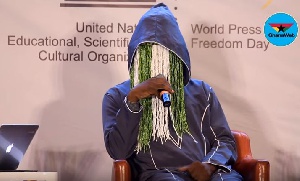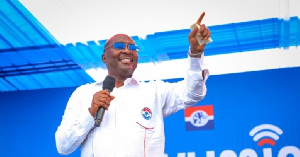For almost 20 years now, the democratic foundations of this country have been shaken to the core.
The resilience and longevity of political governance, accountability, the protection of human rights and democracy at large, have been tested at least once every year through works of Ace investigative Journalist, Anas Aremeyaw Anas. Not forgetting the likes of Manasseh Azure among others.
From his days as a street hawker to expose some corrupt police officers who took bribe under the angry sun ; from his undercover at the High Seas to unearth the inhuman treatment of Ghanaians by a Korean employer; the invasion of the territory of Ghana by Ivorians in 2005; the gory exposè on the use of maggots, expired and infested flour at the Eurofoods company; the demoralizing story of Ghanaian expatriate prisoners in Thai prisons; to his cleaner role during the undercover on the Soja Bar Prostitution in September 2007; then to his biggest hit, Ghana in the Eyes of God about the corruption in the Judiciary, among others.
As Ghana await yet another shocker, dubbed Number 12, one that would name some “bad guys” in the arena of politics and sports, Ghanaians, media practitioners and the entire media world needs to reflect on the pivotal role undercover journalism, though, many argue is unethical. Investigative journalism has deepened constitutional democracy in this country despite the ethical dilemma that it puts reporters in.
Investigative Journalism has ensured the protection of the fundamental human rights of citizens through the watchdogging role; the fight against all degrees of corruption as well as given a fearful facelift to the Fourth Estate of the Realm, the profession.
?
For the purposes of this brief, however, I shall define investigative journalism in the eyes of my protagonist, Anas who says…naming, shaming and jailing (Undercover, 2015). The Investigative Reporters and Editors (IRE) on the other hand puts it this way “In-depth, detailed, original work through a reporter’s own initiative”
I summarize Ghana’s democracy on the other hand in the words of Barack Obama in his address to the parliament of Ghana in 2009 – “ An independent Press. A vibrant private sector. A civil society. Those are the things that give life to democracy”. In extension, an open society where the basic rights of citizens are upheld; a transparent and accountable system of rule and wise use of state resources are critical areas of democracy.
In the history of Ghana, the former has greatly shaped the latter in four basic ways:
Investigative Journalism Has Better Equipped the Ghanaian Media for Results
The freedom and independence of the press guaranteed under chapter 12 of the 1992 Constitution have been obeyed only on paper. Journalists are still not free or independent of the government and private manipulations. Working conditions of journalists still remain poor: a case of the 59th Anniversary parade of Ghana (Reporters bused into a truck to cover the torching of the perpetual flame by the president). Reporters are still abused by public officers in echelons of leadership: a case of Yahaya Kwamoah of Radio Ghana; among many abuses of disregard for journalists across the country.
This, coupled with the absence of the Right to Information Bill, seems to suggest to many media bullies that the Ghanaian media since the military regime has become dormant, hence cannot bite in performing or get daring in performing its social responsibility functions. These bullies argue that the media cannot adopt surreptitious means of performing its watchdog functions. Now for instance, every student of the Ghana Institute of Journalism is jokingly tagged as Anas and on a mission to expose the “bad guys’ in the society.
It has indeed made a profession not a lazy one but a solution-driven one, and this has propelled the development of this country.
It has led the fight against Corruption: A case of Chapter 24 of the Constitution.
Investigative Reporting is increasingly important in mitigating corruption, which is a major impediment to developing democratic institutions and laws (Sullivan, 2013).
Through the undercover of Anas, corruption of varying magnitudes spanning all areas of Ghana’s socio-economic and political development have had some public outrage, judicial address, administrative reforms and prosecutions. Anas’ expose, Passport Scandal did not only lead to the immediate adoption of the biometric passport for Ghanaians as a critical operational reform, it also exposed the criminal doings of passport officials in making passports for non-citizens of this country.
Inside Ghana’s Madhouse 2010 helped to name, shame and jailing of some officials in the Accra Psychiatric Hospital. Similar abuse of minors was brought to book in his project Orphans Home of Hell, an undercover in Ghana’s biggest state-run orphanage.
Furthermore, over 100 members of the Judicial Service, clerks, bailiffs; about 34 judges and magistrates were culprits in the biggest scandal, the Judicial Scandal in September 2015. Some excluded in the 34 were praised for their incorruptible efforts in helping administer quality justice for the country. By this, enterprise reporting doesn’t only name, shame and jail, but also praises good deeds if need be.
Strong Activism Against Human Rights Abuses: A case of Articles (12 – 30) of the Constitution.
Culture and Religion as a way of life of Ghanaians form a large part of our lives in this part of the world. The gross disrespect for human existence is now gradually reducing despite the recalcitrance of some conservative cultural indulgers. The social fabric of the nation hitherto was plagued by many abuses.
Anas’ The Messiah of Mentukwa told of the ordeal of some Christians who fell victims of the ‘Jesus-is-coning-soon’ doctrine by one woman called Helen Jesus Christ. These victims followed this doctrine into solitary confinement. This led to many physical abuses and the denial of the minors to school.
Moreover, Child abuse and child trafficking have had a bite from Anas’ project reporting. 15 kids enslaved to one fake Imam were rescued in his work titled Imam’s school of Shock, 2018
Anas at a point did not only report, he stepped into the witness box to ensure the jailing of the Dons who soled humans in five African countries, Ghana inclusive. Another investigative venture lasted for over eight months.
The aim was to penetrate an international trafficking ring. 17 girls were rescued to the glory of democracy and human existence in that raid.
The Advocacy for True Accountability; Equal Resource Allocation & Social Justice:
Article 1 of the GJA Code of Ethics advocates the right to true information by citizens. Kovach and Rosenstiel’s second element of journalism states that the first loyalty of the journalist is to none but the citizens.
The above ethos and standards are further buttressed by the constitution as argued earlier. But who asks for the periodic reviews or audits of public institutions; who calls for the sensitive-but-relevant details needed for public development that is unlawfully hoarded? ; What comes of the tax-payer’s money? How much is being spent on their roads and other social intervention programs etc?
Decentralization is a pillar of democracy and this demands the equal allocation of state resources. This is at the back of very deplorable conditions of some rural areas in the country. It is worth noting that the efforts of civil societies and other relevant partners in development are dependent on the social justice campaign by investigative journalism.
These bodies, governments and individuals use the data and findings of this venture to provide help to communities who need them. A classic example was the steps taken by the erstwhile Kufuor administration to beef up security for Ghanaians in “Walata” and “Saru” after Anas filed a report titled the Bole Rebel Raid in 2005. This story told of how some inhabitants of the northern corridor were suppressed and abused by Ivorian invaders
Through enterprise journalism, Ghana is not only aware of the deep-seated corruption within sacrosanct bodies like the Judiciary, we have also learned that resources allocated across the country to (for instance ) the Osu Orphanage home, the Accra Psychiatric hospital, the Tema harbor are diverted into individuals’ pockets and accounts.
In conclusion, it goes without saying that Ghana may be experiencing over 25 years of constitutional democracy. However, this story is not complete without the role of the investigative journalist. This profession has helped shape the democratic history of this country and it shall continue to do so through the courageous and faceless works of Anas Aremeyaw Anas and the many hard-working fellows in the profession.
Long live the profession.
Opinions of Monday, 21 May 2018
Columnist: Kabu Nartey
Investigative Journalism and Ghana’s democracy: the empirical case of Anas
Entertainment


















